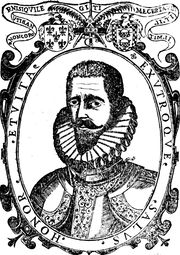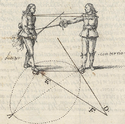|
|
You are not currently logged in. Are you accessing the unsecure (http) portal? Click here to switch to the secure portal. |
Difference between revisions of "Luis Pacheco de Narvaez"
| (8 intermediate revisions by 2 users not shown) | |||
| Line 28: | Line 28: | ||
| title = List of published works | | title = List of published works | ||
| 1 = ''[[Libro de las Grandezas de la Espada (Luis Pacheco de Narváez)|Libro de las Grandezas de la Espada]]'' (1600) | | 1 = ''[[Libro de las Grandezas de la Espada (Luis Pacheco de Narváez)|Libro de las Grandezas de la Espada]]'' (1600) | ||
| − | | 2 = ''[[Las | + | | 2 = ''[[Las cien conclusiones (Luis Pacheco de Narváez)|Las cien conclusiones]]'' (1608) |
| 3 = ''[[Modo facil y nuevo para examinar los maestros en la Destreza de las armas (Luis Pacheco de Narváez)|Modo facil y nuevo para examinar los maestros en la Destreza de las armas]]'' (1625) | | 3 = ''[[Modo facil y nuevo para examinar los maestros en la Destreza de las armas (Luis Pacheco de Narváez)|Modo facil y nuevo para examinar los maestros en la Destreza de las armas]]'' (1625) | ||
| 4 = ''[[Nveva ciencia, y filosofía de la destreza de las armas (Luis Pacheco de Narváez)|Nveva ciencia, y filosofía de la destreza de las armas]]'' (1632) | | 4 = ''[[Nveva ciencia, y filosofía de la destreza de las armas (Luis Pacheco de Narváez)|Nveva ciencia, y filosofía de la destreza de las armas]]'' (1632) | ||
| Line 49: | Line 49: | ||
| below = | | below = | ||
}} | }} | ||
| − | Don '''Luis Pacheco de Narváez''' (1570s–1640) was a [[century::17th century]] [[nationality::Spanish]] philosopher and [[fencing master]]. Born in Baeza, | + | Don '''Luis Pacheco de Narváez''' (1570s–1640) was a [[century::17th century]] [[nationality::Spanish]] philosopher and [[fencing master]]. Born in Baeza, Jaén in the early 1570s, he became the greatest student of [[Jerónimo Sánchez de Carranza]], the grand master of the new school of Spanish fence called [[la Verdadera Destreza]] ("the True Skill"). After Carranza's death in 1600, Pacheco seems to have assumed his mantle of leadership in the Destreza, and ultimately was appointed Head Master of Arms to the royal court by King Phillip IV in 1624. |
| − | Arguably the most prolific fencing author in history, Pacheco published his first treatise on the Destreza, ''[[Libro de las Grandezas de la Espada (Luis Pacheco de Narváez)|Libro de las Grandezas de la Espada]]'' ("A Book on the Greatness of the Sword"), soon after his master's death in 1600. This was followed by at least eight other printed fencing manuals, including a revised edition of Carranza's own work ''[[De la Filosofia de las Armas y de su Destreza y la Aggression y Defensa Cristiana (Jerónimo Sánchez de Carranza)|De la Filosofia de las Armas y de su Destreza]]'' in 1612. His greatest work, ''[[ | + | Arguably the most prolific fencing author in history, Pacheco published his first treatise on the Destreza, ''[[Libro de las Grandezas de la Espada (Luis Pacheco de Narváez)|Libro de las Grandezas de la Espada]]'' ("A Book on the Greatness of the Sword"), soon after his master's death in 1600. This was followed by at least eight other printed fencing manuals, including a revised edition of Carranza's own work ''[[De la Filosofia de las Armas y de su Destreza y la Aggression y Defensa Cristiana (Jerónimo Sánchez de Carranza)|De la Filosofia de las Armas y de su Destreza]]'' in 1612. His greatest work, ''[[Nueva ciencia, y filosofía de la destreza de las armas (Luis Pacheco de Narváez)|Nueva ciencia, y filosofía de la destreza de las armas]]'' ("The New Science and Philosophy of Skill at Arms"), was written in 1632 but doesn't seem to have been published until forty years later, well after his death. |
Pacheco was a very controversial figure in his time. Well known in Spanish literary and political circles, he was occasionally lampooned for his overly-intellectual and philosophical approach to fencing. In 1608, this lead to a duel with noted author Francisco Gómez de Quevedo. In the first pass, Quevedo knocked Pacheco's hat from his head; the duel was subsequently broken up and thereafter the men remained enemies. (Later, Pacheco went as far as to report four of Quevedo's books to the Inquisition.) | Pacheco was a very controversial figure in his time. Well known in Spanish literary and political circles, he was occasionally lampooned for his overly-intellectual and philosophical approach to fencing. In 1608, this lead to a duel with noted author Francisco Gómez de Quevedo. In the first pass, Quevedo knocked Pacheco's hat from his head; the duel was subsequently broken up and thereafter the men remained enemies. (Later, Pacheco went as far as to report four of Quevedo's books to the Inquisition.) | ||
| Line 59: | Line 59: | ||
== Treatises == | == Treatises == | ||
| − | |||
| − | |||
| − | |||
| − | |||
| − | |||
| − | |||
| − | |||
| − | |||
| − | |||
| − | |||
| − | |||
| − | |||
| − | |||
| − | |||
| − | |||
| − | |||
| − | |||
| − | |||
| − | |||
| − | |||
== Additional Resources == | == Additional Resources == | ||
| − | + | {{bibliography}} | |
| − | |||
| − | |||
== References == | == References == | ||
| Line 92: | Line 70: | ||
{{DEFAULTSORT:Pacheco de Narvaez, Luis}} | {{DEFAULTSORT:Pacheco de Narvaez, Luis}} | ||
__FORCETOC__ | __FORCETOC__ | ||
| + | {{early Iberian masters}} | ||
[[Category:Masters]] | [[Category:Masters]] | ||
Latest revision as of 01:22, 19 October 2023
| Luis Pacheco de Narváez | |
|---|---|
 | |
| Born | 1570s Baeza, Spain |
| Died | 1640 |
| Occupation | Fencing master |
| Patron | Philip IV of Spain |
| Movement | Verdadera Destreza |
| Influences | |
| Genres | Fencing manual |
| Language | Spanish |
| Notable work(s) |
|
Don Luis Pacheco de Narváez (1570s–1640) was a 17th century Spanish philosopher and fencing master. Born in Baeza, Jaén in the early 1570s, he became the greatest student of Jerónimo Sánchez de Carranza, the grand master of the new school of Spanish fence called la Verdadera Destreza ("the True Skill"). After Carranza's death in 1600, Pacheco seems to have assumed his mantle of leadership in the Destreza, and ultimately was appointed Head Master of Arms to the royal court by King Phillip IV in 1624.
Arguably the most prolific fencing author in history, Pacheco published his first treatise on the Destreza, Libro de las Grandezas de la Espada ("A Book on the Greatness of the Sword"), soon after his master's death in 1600. This was followed by at least eight other printed fencing manuals, including a revised edition of Carranza's own work De la Filosofia de las Armas y de su Destreza in 1612. His greatest work, Nueva ciencia, y filosofía de la destreza de las armas ("The New Science and Philosophy of Skill at Arms"), was written in 1632 but doesn't seem to have been published until forty years later, well after his death.
Pacheco was a very controversial figure in his time. Well known in Spanish literary and political circles, he was occasionally lampooned for his overly-intellectual and philosophical approach to fencing. In 1608, this lead to a duel with noted author Francisco Gómez de Quevedo. In the first pass, Quevedo knocked Pacheco's hat from his head; the duel was subsequently broken up and thereafter the men remained enemies. (Later, Pacheco went as far as to report four of Quevedo's books to the Inquisition.)
Despite drawing on the prestige of Carranza to great effect in his early career, later in life Pacheco seems to have grown tired of living in his master's shadow. Particularly after becoming the crown fencing master and charged with certifying new masters, he devoted great energy to undermining Carranza's legacy and to exposing (and correcting) perceived flaws in his Destreza. This ultimately broke the tradition into two competing camps, called Carrancistas and Pachequistas, a schism that was never mended.
Treatises
Additional Resources
The following is a list of publications containing scans, transcriptions, and translations relevant to this article, as well as published peer-reviewed research.
- Manuscrito da espada: Biblioteca da Ajuda 49-III-6(2) (2013). Trans. by Diniz Cabreira; Diego Conde Eguileta. Ed. by Manuel Valle; Ton Puey. Santiago de Compostela: AGEA Editora. ISBN 978-84-940366.
- Lições de Marte: Biblioteca da Ajuda 49-III-6(1) (2013). Ed. by Manuel Valle; Laksmy Irigoyen Regueiro. Santiago de Compostela: AGEA Editora. ISBN 978-84-16121-11-3.
- Curtis, Mary Dill; R. E. "Puck" Curtis (2002). "The Circle and the Sword: A Focus on Carranza and Pacheco de Narváez in Renaisance Spain." Spada: Anthology of Swordsmanship 2: 69-76. Ed. by Stephen Hand. Union City: Chivalry Bookshelf. ISBN 1-891448-35-8.
- Fallows, Noel (2012). "Masters of Fear or Masters of Arms? Jerónimo de Carranza, Luis Pacheco de Narváez and the Martial Arts Treatises of Renaissance Spain." The Noble Art of the Sword: Fashion and Fencing in Renaissance Europe 1520-1630: 218-235. Ed. by Tobias Capwell. London: Paul Holberton. ISBN 978-0-900785-43-6.
- Pacheco de Narváez, Luis (2010). Las cien conclusiones o formas de saber de la verdadera destreza y dieciocho contradicciones a las tretas de la destreza común. Ed. by Manuel Valle. Santiago de Compostela: AGEA Editora. ISBN 978-84-938120-4-1.
- Pacheco de Narváez, Luis (2011). Modo fácil y nuevo para examinarse los Maestros en la Destreza de las armas y entender sus cien conclusiones. Ed. by Manuel Valle. Santiago de Compostela: AGEA Editora. ISBN 978-84-935638-1-3.
- Pacheco de Narváez, Luis (2018). Las cien conclusiones (Ms. Phill. 1941). Ed. by Manuel Valle; Jan Schäfer; Samara Ajjour. Santiago de Compostela: AGEA Editora. ISBN 978-84-948682-7-6.
- Pacheco de Narváez, Luis (2022). The One Hundred Conclusions (Ms. Phill. 1941). Trans. by Manuel Valle; Jan Schäfer. Ed. by Lois Spangler. Santiago de Compostela: AGEA Editora. ISBN 978-84-122369-5-8.
- Sánchez García, Darío (2022). "Analysis of footwork diagrams from Libro de las grandezas de la espada." Acta Periodica Duellatorum 10(1): 73-96. doi:10.36950/apd-2022-005.
References
|
|||||||||||||||||||||||||||

